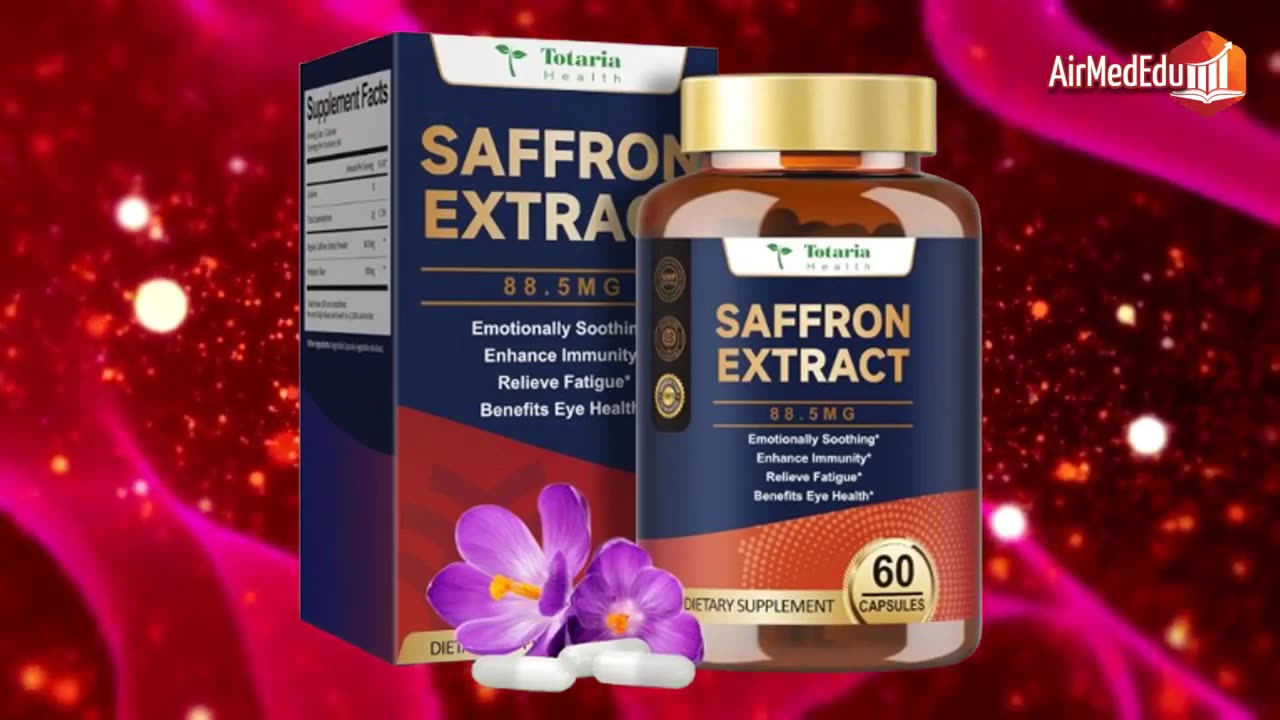Premium Only Content

Saffron Extract, An Ally for Comprehensive Health in Maturity
Saffron, known as "red gold" for its value and properties, is a spice derived from the stigmas of the Crocus sativus flower. Its use in traditional medicine dates back thousands of years, from Middle Eastern cultures to Ayurvedic and Chinese medicine. In recent years, science has validated many of its benefits, especially for adults over 40, a time when age-related physiological changes, such as decreased cognitive function, increased oxidative stress, and hormonal alterations, can impact quality of life.
Below, we will explore in detail the pharmacological effects of saffron extract, its biochemical processes in specific organs, its relevance for this population, and the standard recommended doses, along with essential precautions. The approach is optimistic, grounded in science, and seeks to empower readers to make informed decisions about their health.
Saffron extract contains key bioactive compounds, such as crocin, safranal, crocetin, and kaempferol, which are responsible for its antioxidant, anti-inflammatory, antidepressant, and neuroprotective properties. These compounds interact with specific biological systems, modulating cellular processes and improving the function of vital organs. Below, we describe the benefits of saffron, its impact on specific organs, and its relevance for adults over 40, considering the physiological changes associated with aging.
Saffron has a notable effect on the brain, particularly in modulating mood. Its compounds, such as crocin and safranal, increase serotonin and dopamine levels by inhibiting their reuptake, a mechanism similar to that of pharmaceutical antidepressants, but with fewer side effects. In clinical studies, a daily dose of 30 mg of saffron extract has been shown to reduce symptoms of mild to moderate depression by 32–33% after 6–12 weeks, which is crucial for older adults who face a higher risk of mood disorders due to hormonal changes and chronic stress. This effect occurs in the limbic system, particularly the amygdala and hippocampus, regions that regulate emotions. The relevance for this population lies in the natural decline of neurotransmitters with age, which can exacerbate anxiety and depression.
Cognitive health is another area where saffron shines. Its antioxidant properties protect neurons in the hippocampus and prefrontal cortex from oxidative damage, a key factor in age-related cognitive decline. Crocin increases levels of acetylcholine, a neurotransmitter essential for memory, by inhibiting acetylcholinesterase. In studies with adults over 55 years of age, 30 mg of saffron extract daily for 4 months improved scores on psychometric tests, suggesting a potential for delaying mild cognitive impairment. This is especially relevant for those who experience frequent forgetfulness or difficulty concentrating, common in the 40s and older due to reduced neuronal plasticity.
The central nervous system also benefits from saffron's anti-inflammatory properties. Crocetin and safranal reduce neuroinflammation by inhibiting proinflammatory cytokines such as TNF-α and IL-6, which tend to increase with age and contribute to neurodegenerative diseases such as Alzheimer's. In preclinical trials, saffron has shown the ability to reduce the formation of amyloid plaques in the brain, protecting neurons in the cortex and hippocampus. A dose of 30 mg daily is sufficient to obtain these neuroprotective benefits, making it a promising tool for older adults concerned about dementia prevention.
Saffron also supports eye health, a critical aspect for older adults, as age-related macular degeneration is common after age 40. Crocin protects retinal cells from oxidative stress by neutralizing free radicals. In one study, 20 mg of saffron extract daily for 3 months improved retinal sensitivity and response to light in patients with early AMD. This effect is due to crocin's ability to improve circulation in retinal vessels and reduce local inflammation. Since vision tends to deteriorate with age, saffron offers a natural preventative strategy.
The heart is another organ that benefits from saffron, especially in a population prone to cardiovascular disease due to the accumulation of atherosclerotic plaque and increased LDL cholesterol. Crocetin reduces blood lipid levels by inhibiting cholesterol absorption in the intestine and improving the liver lipid profile. Furthermore, its antioxidant properties protect the vascular endothelium from damage caused by free radicals, improving arterial elasticity. In studies, 30 mg of saffron daily for 3 months reduced LDL cholesterol and triglycerides, which is vital for older adults who face an increased risk of hypertension and atherosclerosis.
Liver function is also supported by saffron. Its antioxidants, such as kaempferol, protect liver cells from oxidative stress, a factor that intensifies with age due to the decline of endogenous antioxidant defenses.
Crocetin stimulates bile production, facilitating fat digestion and preventing gallstone formation. In preclinical trials, saffron has shown hepatoprotective effects by reducing elevated liver enzymes in cases of oxidative damage. A dose of 30 mg per day is sufficient to support liver health, which is crucial for older adults with slower digestive systems.
The digestive system benefits from saffron's anti-inflammatory and carminative properties. Bitter compounds, such as picrocrocin, stimulate gastric secretions, improving digestion and reducing flatulence. This is especially important for older adults, as digestive enzyme production declines with age, which can lead to discomfort such as bloating or constipation. A dose of 15–30 mg per day in supplement or tea form can alleviate these symptoms, acting primarily on the stomach and small intestine.
In the context of metabolic health, saffron helps regulate blood glucose levels, a critical aspect for older adults prone to type 2 diabetes. Crocin improves insulin sensitivity by activating glucose signaling pathways in the liver and skeletal muscle. In one study, 30 mg of saffron daily for 8 weeks significantly reduced fasting glucose and hemoglobin A1c levels. This effect is vital for counteracting insulin resistance, which increases with age due to changes in metabolism.
Saffron also has a positive impact on the endocrine system, especially in women over 40 who are undergoing perimenopause or menopause. Its regulatory properties help mitigate vasomotor symptoms such as hot flashes and night sweats by influencing serotonergic receptors in the hypothalamus, which regulate body temperature. In one study, 28 mg of saffron extract (Affron®) per day for 12 weeks significantly reduced these symptoms in perimenopausal women. This is relevant, as hormonal changes during this period can affect quality of life.
Sexual health in both men and women is enhanced by saffron due to its aphrodisiac properties. In men, 30 mg daily improves erectile dysfunction by increasing penile blood flow through the vasodilatory action of crocetin. In women, saffron increases lubrication and sexual desire by modulating serotonin levels in the brain. These effects are particularly valuable for older adults, as libido tends to decline with age due to hormonal and vascular changes.
The immune system also benefits from saffron, as its antioxidants, such as vitamin C and manganese, strengthen the immune response by protecting lymphocytes from oxidative damage. A dose of 30 mg daily can support immune function, which is crucial for older adults whose immunity declines with age, increasing the risk of infections.
The skin, an organ that reflects aging, benefits from saffron's antioxidant and anti-inflammatory properties. Crocin and kaempferol protect skin cells from UV radiation damage and reduce inflammation in conditions such as dermatitis. Topical applications of saffron extract (mixed with honey or milk) or an oral dose of 20 mg daily can improve skin hydration and elasticity, counteracting the dryness and collagen loss typical of aging.
Saffron also contributes to bone health, a critical aspect for older adults who face a higher risk of osteoporosis. Its antioxidants reduce oxidative stress in osteoblasts, promoting bone formation. Although studies are preliminary, 30 mg daily may complement a diet rich in calcium and vitamin D, supporting bone density in the femur and spine.
In the respiratory setting, saffron has a mild expectorant action that relieves coughs and improves lung function by reducing inflammation in the bronchial tubes. A dose of 15 mg daily as an infusion may be helpful for older adults with frequent colds or mild asthma, conditions that worsen with age-related decline in lung capacity.
The renal system benefits from saffron's mild diuretic properties, which help eliminate toxins and reduce inflammation in the kidneys. Crocetin protects kidney cells from oxidative damage, which is important for older adults with decreased kidney function. A dose of 30 mg daily may support kidney health, although it should be used with caution in people with pre-existing kidney disease.
Saffron also plays a role in modulating body weight, a relevant aspect for older adults facing metabolic changes. Crocin reduces appetite by influencing the satiety centers of the hypothalamus, leading to a decrease in body mass index and waist circumference. In one study, 30 mg daily for 8 weeks significantly reduced fat mass. This is crucial for preventing obesity, which increases the risk of metabolic diseases in this population.
In terms of joint health, saffron's anti-inflammatory properties relieve joint pain by reducing inflammatory cytokines in cartilage and synovial tissue. A dose of 30 mg daily may be a natural alternative for older adults with joint discomfort due to osteoarthritis, a common condition with aging.
Saffron may also improve sleep, a critical aspect for older adults who often experience insomnia. Safranal has a mild sedative effect by interacting with GABA receptors in the brain, promoting relaxation. A dose of 15–30 mg before bedtime may improve sleep quality, helping to counteract circadian rhythm disturbances that intensify with age.
In the context of cancer, saffron's antioxidants, such as crocin, have shown in vitro studies to inhibit the proliferation of cancer cells in organs such as the breast, colon, and lung. Although further human studies are needed, a dose of 30 mg daily may have a preventative effect by reducing oxidative damage to cellular DNA, a risk factor that increases with age.
Bladder health also benefits, as saffron has anti-inflammatory properties that can reduce recurrent urinary tract infections, common in older women. A dose of 15 mg daily can complement conventional treatments by acting on the bladder mucosa.
Saffron also has a positive effect on the lymphatic system by improving lymphatic circulation and reducing inflammation, which can relieve swelling in the extremities, a common problem in older adults. A dose of 30 mg daily may be helpful, especially in combination with moderate exercise.
The male endocrine system benefits from saffron, as it improves testosterone production in the testes by reducing oxidative stress. This is relevant for men over 40 who experience a natural decline in this hormone. A dose of 30 mg daily can support male vitality.
In women, saffron relieves the symptoms of premenstrual syndrome
and postpartum depression by modulating serotonin levels in the brain. Although PMS is less common after age 40, postpartum or postmenopausal depression can benefit from 15-30 mg daily, improving emotional well-being.
Saffron also supports pancreatic health by improving the function of beta cells, responsible for insulin production. This is crucial for preventing type 2 diabetes, which is more prevalent in older adults. A dose of 30 mg daily can complement a low-sugar diet.
Oral health is also supported by saffron's antibacterial properties, which reduce plaque on the gums. Rinsing with a 15 mg saffron decoction can relieve gingivitis, a common problem in older adults due to decreased saliva production.
The musculoskeletal system benefits from saffron's analgesic properties, which relieve post-exercise muscle soreness by reducing muscle inflammation. A dose of 30 mg per day may be helpful for older adults seeking to stay active, counteracting the muscle stiffness associated with age.
Saffron also has a positive effect on the circulatory system by improving microcirculation in peripheral tissues, which reduces the feeling of tired legs. A dose of 30 mg per day may be beneficial for older adults with venous circulation problems.
On the emotional level, saffron reduces chronic stress by lowering cortisol levels in the adrenal glands. This is crucial for older adults facing increased stress due to life changes or health concerns. A dose of 15–30 mg per day can promote a calm state.
Saffron also protects the auditory system by reducing oxidative damage to the hair cells of the inner ear, which may delay age-related hearing loss. Although studies are preliminary, 20 mg daily may be a preventative strategy.
Prostate health in men over 40 benefits from saffron's anti-inflammatory properties, which reduce inflammation in the prostate and may alleviate symptoms of benign prostatic hyperplasia. A dose of 30 mg daily may be a useful supplement.
Saffron also has a positive effect on the lymphatic system by improving lymphatic circulation and reducing inflammation, which can relieve swelling in the extremities, a common problem in older adults. A dose of 30 mg daily may be helpful.
In the context of mental health, saffron improves emotional resilience by modulating serotonin and dopamine levels in the brain, which is crucial for older adults facing emotional challenges due to life or health changes. A dose of 30 mg per day may be effective.
Saffron also supports colon health by reducing inflammation and protecting intestinal cells from oxidative damage, which can prevent diseases such as colorectal cancer. A dose of 30 mg per day is sufficient to achieve these benefits.
Finally, saffron has a positive effect on the female endocrine system by reducing menopausal symptoms such as irritability and fatigue by influencing serotonergic receptors in the brain. A dose of 28 mg per day can significantly improve quality of life in women over 40. Summary of Benefits and Target Organs
Saffron extract offers a wide range of benefits for adults over 40, positively impacting multiple organs and systems: the brain (improving mood, cognition, and neuroprotection), the eyes (protection against AMD), the heart (improving lipid profile and arterial elasticity), the liver (antioxidant protection and fat digestion), the digestive system (improving digestion and reducing flatulence), the endocrine system (relieving menopausal symptoms and improving libido), the immune system (strengthening immune response), the skin (hydration and UV protection), the bones (supporting bone density), the lungs (cough relief), the kidneys (antioxidant protection), the muscular system (reducing post-exercise soreness), the circulatory system (improving microcirculation), the adrenal glands (stress reduction), the ear (hearing protection), the prostate (inflammation relief), the colon (cancer prevention), and the pancreas (improved insulin function). These benefits are particularly relevant for counteracting the physiological changes of aging, such as increased oxidative stress, decreased cognitive function, and hormonal changes.
The standard dosage for most benefits is 15–30 mg per day of standardized saffron extract (with at least 2% safranal and 3% crocin), taken in capsules or as an infusion, preferably with food to enhance absorption. For eye health, 20 mg per day is sufficient, while for menopausal symptoms, 28 mg per day has been shown to be effective. It is crucial to choose high-quality, preferably organic, products with certifications that guarantee the absence of adulterants such as turmeric or paprika. Precautions include avoiding doses above 1.5 g per day, as these can cause dizziness, nausea, or diarrhea, and doses of 5 g or more are toxic. Pregnant women should avoid high doses of saffron due to the risk of uterine contractions, and people with allergies should be alert for possible reactions. Those taking antidepressants or blood pressure medications should consult a doctor, as saffron may interact with these drugs.
While saffron extract offers significant benefits, its effectiveness is maximized when combined with a balanced diet rich in fruits, vegetables, lean proteins, and healthy fats, along with regular exercise and adequate sleep. These habits reinforce saffron's antioxidant and anti-inflammatory effects, promoting overall health. Unlike other supplements on the market, such as turmeric or ginseng, saffron stands out for its specific action on the gut-brain axis and its ability to address emotional, cognitive, and physical symptoms simultaneously, making it unique for older adults.
Saffron extract is a promising supplement for improving health and well-being in adults over 40, but its use should be informed and supervised. Consult your doctor or a nutritionist before incorporating saffron into your routine, especially if you have pre-existing medical conditions or are taking medications. Take control of your health with science-based decisions and enjoy a fuller, healthier life.
-
 2:14:09
2:14:09
LFA TV
19 hours agoRUMBLE RUNDOWN WEEK 6 with JEREMY HERRELL AND SHAWN FARASH 11.15.25 9AM
71.6K5 -
 1:44:16
1:44:16
HotZone
3 hours agoLive: The Hidden Crisis in US Special Ops: What They’re Not Telling You About Women in Combat
112 -
 53:13
53:13
X22 Report
2 hours agoMr & Mrs X - It All Revolves Around Marxism, Think Political Correctness, Midterms Are Safe - EP 16
15.3K7 -
 5:39
5:39
Talk Nerdy Sports - The Ultimate Sports Betting Podcast
15 hours ago10 College Football Bets You MUST Take Today (Nov 15)
8 -
 1:02:31
1:02:31
Wendy Bell Radio
6 hours agoPet Talk With The Pet Doc
4.76K25 -
 23:12
23:12
Jasmin Laine
20 hours agoPoilievre LOSES PATIENCE—His “Who CARES?” Moment SHOCKED Everyone
100K37 -
 LIVE
LIVE
Sgt Wilky Plays
4 hours agoFirst Run of Black Ops 7 after the Beta | Multiplayer
273 watching -
 6:49
6:49
The Car Guy Online
13 hours ago $8.53 earned2025–2026 Duramax FAILURES Begin! GM’s NEW Engine Nightmare? Silverado, Sierra, Yukon...
18.9K21 -
 LIVE
LIVE
Boxin
4 hours agoKingdom Hearts! This is Halloween Town!
181 watching -
 8:34
8:34
Millionaire Mentor
20 hours agoTrump FIRES BACK After Mamdani’s SHOCKING Threat To New York City
40.1K43